 The Local Superintendents Advisory Council (LSAC) approved a draft regulation during its meeting on Nov. 23 on the use of corporal punishment in schools. The draft regulation will go before the Kentucky Board of Education (KBE) at its meeting on Dec. 1 for approval.
The Local Superintendents Advisory Council (LSAC) approved a draft regulation during its meeting on Nov. 23 on the use of corporal punishment in schools. The draft regulation will go before the Kentucky Board of Education (KBE) at its meeting on Dec. 1 for approval.
A Kentucky state statute from 1982 permits the use of corporal punishment by teachers for classroom discipline, while a 2019 state statute requires the Kentucky Department of Education (KDE) to provide resources related to trauma-informed discipline and requires school districts to adopt trauma-informed discipline policies. Corporal punishment is not a trauma-informed discipline resolution.
Matthew Courtney, policy advisor in KDE’s Office of Continuous Improvement and Support (OCIS), said KDE has advocated for a prohibition against corporal punishment for about 30 years.
“There is a persistent rub between our requirement for trauma-informed discipline and this ability to use corporal punishment in schools,” said Courtney. “Based on KBE’s responsibility to regulate student discipline, as well as to promulgate regulations related to student welfare, we have seen fit to bring this regulation before you today and before the board next week.”
Since corporal punishment cannot be viewed through a trauma-informed lens, KDE applied a harm reduction approach in drafting the new corporal punishment regulation, a framework that usually is applied to substance use policy.
Courtney said KDE pointed to four harm reduction principles in the draft regulation:
- Accepts that the action will occur and seeks to minimize harmful effects;
- Acknowledges that some forms of punishment are safer than others;
- Ensures those involved have a voice in the situation; and
- Does not seek to minimize the real harm and danger associated with the activity.
The draft regulation defines corporal punishment as the deliberate infliction of physical pain by any means upon the whole or any part of a student’s body as a penalty or punishment for student misbehavior. It also seeks to exempt from corporal punishment students with an Individual Education Plan (IEP), 504 plan and those who are classified as homeless or are in foster care.
Courtney noted that KDE is against corporal punishment, but since it is still allowed by state statute, the agency is seeking to limit the harm.
“If we are going to introduce trauma into the lives of students, we should take steps to actively undo that trauma,” he said.
The draft regulation requires schools that choose to permit corporal punishment to require a student’s legal guardians to provide written consent within the first five days of the school year if the guardian wishes to allow corporal punishment to be used as a behavior intervention for their child. Before administering corporal punishment, the school must receive an additional affirmative verbal consent.
The corporal punishment must be administered by a principal or assistant principal and must be in the presence of at least one additional certified staff member who is the same gender as the student. Each corporal punishment incident must be recorded in the student information system.
After administering corporal punishment, the school must ensure that the student receives a minimum of 30 minutes of counseling provided by the school guidance counselor, school social worker, school psychologist or other qualified mental health professionals by the end of the next school day.
KBE must approve the regulation before it goes into effect. If the regulation is approved by KBE, each local school board must adopt a policy that either prohibits or allows use of corporal punishment.
There currently are 156 districts in Kentucky that explicitly prohibit the use of corporal punishment in their district policy manuals. Four school districts have permissive policies and 11 have no clear corporal punishment policy.
Other draft regulations
The LSAC also approved a draft regulation for the annual in-service training of district school board members that sets the process the Kentucky School Boards Association will follow for providing training to members, recording the training, reporting to KBE once a year which members did not meet the training requirements, getting an extension for those who have not had the training and reporting any who do not meet that deadline to the attorney general’s office.
Council members also approved a draft regulation that ensures teachers who are working in alternative education programs receive appropriate professional development.
“Those teachers may need additional training in literacy or mediation, or if the alternative program is doing an online program,” said Kelly Foster, KDE associate commissioner in OCIS.
The council also approved an updated version of a previously approved regulation regarding district employee quarantine leave. Like the previous version, the new draft regulation requires that any employee exposed to COVID-19 be placed into quarantine by a medical provider, but changes the language to clarify it must be by a licensed treating physician, physician’s assistant or advanced practice registered nurse.
The draft regulation also clarifies that a vaccinated individual is someone who has received two doses of the Pfizer or Moderna vaccines, or one dose of the Johnson & Johnson vaccine.
The council also heard about updates to the extended school services (ESS) regulation, which provides funding for districts to focus on students performing below expectations through additional support.
The ESS funding formula relies on three components: average daily attendance, an economic deprivation indicator and an accountability indicator. The accountability indicator is being updated to align with the latest changes to the state’s accountability statutes and regulations.
Previously, the funding formula relied on an overall score that was produced in the accountability system. However, an overall score is no longer calculated. Instead, the ESS formula will now rely on a combined reading and math novice percentage as part of the calculation to distribute ESS funds to districts.
The council took no position on this regulation.



Leave A Comment